Maren Ade Toni Erdmann Interview
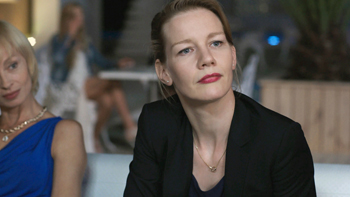
Maren Ade Toni Erdmann Interview
Cast: Peter Simonischek, Sandra Hüller, Michael Wittenbor
Director: Maren Ade
Genre: Comedy, Drama
Rated: M
Running Time: 162 minutes
Synopsis: Winfried doesn't see much of his working daughter Ines. The suddenly student-less music teacher decides to surprise her with a visit after the death of his old dog. It's an awkward move because serious career woman Ines is working on an important project as a corporate strategist in Bucharest. The geographical change doesn't help the two to see more eye to eye. Practical joker Winfried loves to annoy his daughter with corny pranks. What's worse are his little jabs at her routine lifestyle of long meetings, hotel bars and performance reports. Father and daughter reach an impasse, and Winfried agrees to return home to Germany. Enter flashy „Toni Erdmann': Winfried's smooth-talking alter ego. Disguised in a tacky suit, weird wig and even weirder fake teeth, Toni barges into Ines' professional life, claiming to be her CEO's life coach. As Toni, Winfried is bolder and doesn't hold back, but Ines meets the challenge. The harder they push, the closer they become. In all the madness, Ines begins to understand that her eccentric father might deserve some place in her life after all.
Toni Erdmann
Release Date: February 2nd, 2017
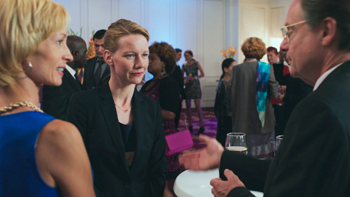 Interview with Maren Ade
Interview with Maren Ade
Question: How was the idea for Toni Erdmann born? Is it autobiographical?
Maren Ade: All my films are partly autobiographical in the sense that I take something I know as a point of departure. When it comes to the subject of family, it was interesting to see how little I was able to escape my own family while writing. There's nothing you know better than where you came from. You only have one family, and the relationship between parents and children is for life; it's hard to escape that. That's what happens with Ines in Toni Erdmann. She thinks the family in which she grew up holds nothing of relevance in her present life; they're all trapped in their assigned roles and their interactions play out according to rigid, almost ritualistic patterns none of them can escape.
Question: What gave you the idea for the Toni character invented by Ines's father Winfried?
Maren Ade: Winfried's impulsive transformation is a bold attempt to break out of the mould of the father-daughter relationship. 'Toni Erdmann" is born out of desperation. Humour is often a way of coping with things, and as such it is always also a product of pain. Winfried is unable to get through to his daughter any other way. He tried to redefine his relationship with her as a father and failed, and now he's at a loss, torn between his desire for more closeness with Ines and the resentment he feels towards her. The balance of power between them shifted long ago. Winfried finds a way out of this dilemma with the brash offer he makes Ines in the guise of Toni. Humour is his only weapon, and he starts using it to the hilt. That means playing a much tougher game, and since Ines is a tough cookie herself, he's suddenly speaking a language she understands.
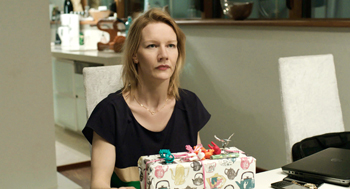 Question: Your female protagonists constantly grapple with their conflicts. Is that typical of the women you see and experience in contemporary society?
Question: Your female protagonists constantly grapple with their conflicts. Is that typical of the women you see and experience in contemporary society? Maren Ade: Ines works in a male-dominated field, and she has really internalized that. She may actually even regard herself as 'one of the guys" – the problem is that, when push comes to shove, they don't see it that way. I've interviewed quite a few women in leadership positions, and most of them claim to enjoy being the exception to the rule, even though it means they're lonely at times.
In that sense I guess Ines is a contemporary female character. She started out convinced that self-determination and equality were things women of her generation could take for granted so that she had no need for feminism. When she says, 'I'm not a feminist or I wouldn't tolerate guys like you", she really means it. She refers to the 'women's group" and 'sexual harassment at work" ironically, and she assumes the same sarcastic, sexist tone in her comment about Anca 'pushing the buttons." But to be honest, I never intended to do something especially critical of sexism in the business world. I merely wanted to show things the way they are, and sexism is a part of that reality. The whole gender issue actually kind of gets on my nerves, especially when it's given so much weight. As a woman, I'm used to identifying with male characters. I mean, when I watch a James Bond movie, I'm not the Bond Girl, I'm James Bond, too.
Maybe it's best to think of Ines as a contemporary, gender-neutral character – much like a man who cries now and then and has father issues.
Question: After Everyone Else, this is the second film you've shot outside Germany. Why did you choose to set Toni Erdmann in Bucharest? What did you find particularly interesting about Romania as a location?
Maren Ade: Setting large parts of the film in another country had two major advantages in terms of the story I wanted to tell. That the two main protagonists face off far from home, isolated and unencumbered by the constraints of their familiar surroundings, highlights the conflict between father and daughter and gives it added force. And having Winfried visit his daughter in another country and bring the feeling of 'home" with him underscores how foreign that element has become in Ines's life. With both of my films, I simply felt freer shooting abroad. Sometimes it helps if you don't know too much. I'm not sure if I would have dared to do the kukeri scene the way I did if we'd been shooting in downtown Berlin, for instance. And last but not least, the fact that Bucharest served as the location of great films like those of Corneliu Porumboiu, Christi Puiu, and our producer, Ada Solomon, piqued my curiosity. And as it turned out, working there really was a wonderful experience.
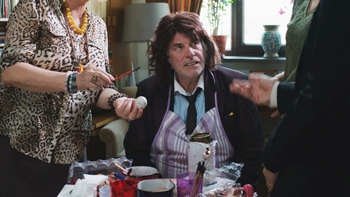 Question: So what initially appears to be a simple family conflict turns out to be much more than that: a conflict between generations?
Question: So what initially appears to be a simple family conflict turns out to be much more than that: a conflict between generations? Ines, on the other hand, regards the complacent certitudes that govern Winfried's supposedly politically correct life as too facile. It was easier for those of his generation to take a stand because it was easier for them to set themselves apart from the generation before them and to separate friend from foe.
Although Winfried has since given in to resignation, his old rebelliousness resurfaces in the guise of Toni. When Ines deliberately puts him in a situation that gives him insight into what her work entails, the old political questions become more personal and assume renewed urgency, and his reaction bespeaks the fact that his naively humanitarian outlook has given way to uncertainty.
Question: A lot of directors say doing comedy is really hard work. What was your experience?
Maren Ade: Shooting those scenes really wasn't easy. The important thing for the comic moments and the movie as a whole was making sure Toni was believable as a human being and yet still have Winfried remain visible underneath. Toni couldn't just become a character out of a fantasy film, the film couldn't just switch genres mid-stream. We spent three whole days on the bar scene, rehearsing it extensively. Peter and I systematically tried out various approaches. The hardest thing was for him to hide what a skilled actor he is. Winfried's supposed to be an ordinary teacher playing a role, not a professional, and it's extremely difficult for a good actor to play a bad one. Peter himself would have the skills to make Toni seem much more real, to heighten the drama and make him even funnier, but the humour arises precisely from the fact that it's Winfried who's playing Toni and not a professional actor. Getting that just right was hard work.
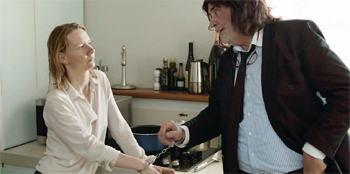 Question: How did you and your director of photography, Patrick Orth, prepare for the movie?
Question: How did you and your director of photography, Patrick Orth, prepare for the movie? Maren Ade: The aim was to give the actors as much freedom and keep things as open during the shoot as possible. On a technical level, that meant we generally used 180-degree lighting and were all prepared to go with the flow when things developed unexpectedly, like letting a scene run longer than originally planned. During the preparation phase, Patrick Orth was there for every rehearsal, filming, taking photographs and getting a feel for the sets and lighting. We extensively discussed story perspectives. So working with the actors and the camera was a laborious process. We spent a lot of time on the set working through each scene down to the last detail, even if we would sometimes end up throwing everything overboard again on the day of the shoot. I really believe you have to spend a lot of time with the actors beforehand to get to a point where the camera can respond to them without it feeling like a documentary.
Question: So you aimed for everything to be as realistic as possible?
Maren Ade: I don't like to cut corners in the narrative. I need to be able to believe every step the characters take along the way; it doesn't have to be particularly probable, but at least possible. Even though realism was the prime consideration, I still wanted to allow for surprises and larger-than-life 'movie moments." But I wanted them to develop from the characters rather than being affected by me as the director.
That's why I decided to create a situation that makes the characters feel like they're acting in a movie. Toni introduces that element into Ines's and Winfried's life – an element of playfulness, boldness, freedom – and allows them to experience themselves in a new way. Thanks to Winfried's goofy idea, suddenly anything is possible. So I guess you could say a slightly heightened realism was what we were aiming for in terms of cinematography and Silke Fischer's set design.
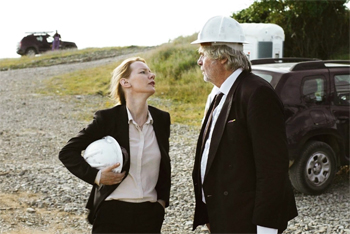 Question: The naked party – an impulsive decision resulting in the ultimate challenge, the ultimate surprise… What gave you the idea?
Question: The naked party – an impulsive decision resulting in the ultimate challenge, the ultimate surprise… What gave you the idea? Maren Ade: A female character throwing a naked birthday party is an idea I've had for a long time. Much like the Toni character, the naked party is an almost desperate attempt to find a way out of a stalemate. The fact that the dress turns out to be too tight provides Ines with an excuse, but what she really wants is profound change. She doesn't decide to throw the party just for the fun of it, but to rid herself of her boss and false friends. Ines discovers that it isn't quite so easy to cast things off and break taboos, because nowadays anything goes… all you need is the right slogan. On the one hand, it's liberating to realise that you can actually get away with a lot more than you might have thought, but on the other hand it's kind of depressing to realize there are hardly any taboos left to break.
Question: Is the film a plea for letting go?
Maren Ade: To me, 'letting go" sounds too much like 'giving up," too much like something out of a self-help book. My film is less a plea for letting go than a plea for coming clean. What Ines does at the end is pretty radical and takes a lot of guts. It may be a bit nuts, but it's a new beginning: From that day on, she'll always be the woman who greeted her boss at the door naked. She isn't letting go of anything, she's actually taking the reins back into her own hands. At the very end, we see two people who have perhaps grown to know and accept themselves and each other a bit better. We could also see Toni in terms of the common expression 'hiding" behind a role, but I actually think Winfried reveals himself in the roles he plays. That's particularly true for the kukeri, which is really his inner self – a big, melancholy creature with a funny-looking head.
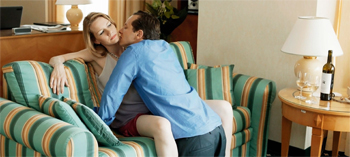 Question: Is the movie also about things coming to an end?
Question: Is the movie also about things coming to an end? Maren Ade: Any relationship between parents and children is full of goodbyes. When something new begins for a child, it often means that something ends for the parents. I'm seeing that with my own kids now. My son is thrilled every time he grows another centimeter, and I get wistful.
That's why I included a series of goodbyes in the movie. Winfried's student quits, his dog dies, and he and his daughter exchange goodbyes a number of times without ever having a warm farewell. Their embrace at the end is an attempt to convey that sort of goodbye. The kukeri costume transforms Winfried, so that for a brief moment, he appears to Ines like the big, lumbering, warm father she knew as a child and she can be the little girl she once was.
Toni Erdmann
Release Date: February 2nd, 2017
MORE
- Mission: Impossible Fallout
- Glenn Close The Wife
- Allison Chhorn Stanley's Mouth Interview
- Benicio Del Toro Sicario: Day of the Soldado
- Dame Judi Dench Tea With The Dames
- Sandra Bullock Ocean's 8
- Chris Pratt Jurassic World: Fallen Kingdom
- Claudia Sangiorgi Dalimore and Michelle Grace...
- Rachel McAdams Disobedience Interview
- Sebastián Lelio and Alessandro Nivola...
- Perri Cummings Trench Interview



